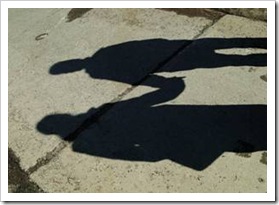Fears are very natural in every person’s life. From an early stage of our life, we are scared of various things. As we grow older and learn more about life, more of the world makes sense to us and many of our fears disappear.
Unfortunately, many kids are not treated seriously when they express their fears and this makes them even more afraid. Fear has many faces and symptoms and when it is not handled well, it can get out of proportion and lead to growing up with anxiety, panic attacks and depression.
Kids express fears of many different things. Here are examples of things kids are afraid of:
- I am afraid of the dark
- I am afraid of monsters under my bed
- I am afraid of spiders (snakes, dogs, etc)
- I am afraid of bad dreams
- I am afraid of shadows
 I am afraid of thunder and lightning
I am afraid of thunder and lightning- I am afraid of strangers
- I am afraid of drowning
- I am afraid to stay by myself
- I am afraid when Mom and Dad fight
- I am afraid of being punished
- I am afraid something bad might happen to me or to someone in my family
- I am afraid of what people might say
- I am afraid of getting hurt
- I am afraid I might fail
- I am afraid to speak in front of people
- I am afraid I won’t know what to say
- I am afraid I won’t know what to do
If we want to help our kids, it is important for us as parents to detect when our kids are afraid and to discover what they are afraid of specifically.
The symptoms of fears are uncomfortable feelings in the stomach, cold sweat, dry mouth, tears, “weak knees” and sometimes even a physical illness.
 Some of the kids’ fears are based on their lack of knowledge and experience. Those things will change over time, as long you do not belittle your kids and make fun of their feelings. If they tell you they are afraid of dragons, resist saying, “Dragons aren’t real” and bring your kids some books or videos about funny dragons instead.
Some of the kids’ fears are based on their lack of knowledge and experience. Those things will change over time, as long you do not belittle your kids and make fun of their feelings. If they tell you they are afraid of dragons, resist saying, “Dragons aren’t real” and bring your kids some books or videos about funny dragons instead.
Other fears come from exposure to movies, books and horrible stories that are unreal or grossly exaggerated. For example: watching movies about aliens kidnapping humans might cause your kids to be afraid of being kidnapped.
I would recommend limiting the exposure to unrealistic or exaggerated movies and stories to a time when the kids can understand they are not real. Be guided by the movie’s rating (I was shocked to hear a group of 11-year-olds who came to sleep over at our house discussing “The Sixth Sense”). When you feel a movie might scare your kids, talk to them about it and field any concerns before they grow too big.
Some fears come from exposure to sad events of other people. People getting hurt might create fears of getting hurt. Friends’ parents separating might create fears of parents fighting as a lead-up to separation. Close people getting sick might create fears of getting sick too.
Talk to your kids about these events and find ways to reassure them they will be fine. If it is fears of separation, reassure them that, although you have conflicts, you love each other very much. When the kids are around, hug and show affection to each other and avoid arguing. If they are afraid of getting sick, talk to them about what they can do to stay healthy: eat well, drink lots of water, sleep well and, of course, think happy thoughts!
 Some fears are passed from parents to kids. It starts with the need to protect kids from harm, but can give them a mental picture of a scary and dangerous world that should not be trusted. It is very important to find the balance between scaring kids and protecting them. You can teach them to be careful, but do not teach them to be scared. No, not all strangers are bad.
Some fears are passed from parents to kids. It starts with the need to protect kids from harm, but can give them a mental picture of a scary and dangerous world that should not be trusted. It is very important to find the balance between scaring kids and protecting them. You can teach them to be careful, but do not teach them to be scared. No, not all strangers are bad.
Fearing what other people might think about you are very common among kids and grownups alike. Surprisingly, most people would rather die than speak in public. If kids express fear of speaking or what others might think about them, it is good for parents to find out if they have transferred this fear to their kids. In any case – work on self esteem is needed.
Tips to handle the fear monster
- Do not ever say “This is silly”, “Nonsense” or “There are no aliens”. This will only make your kids stop telling you how they feel.
- Ask your kids “How can I help you make it go away?”
- Teach your kids to distinguish between “afraid”, “nervous” and “worried” to allow them to express themselves better.
- Teach your kids that unknown may be scary, but can also be exciting.
- Play with your kids moderated scary games to help them work out their fears. Take showers in the dark, dine in candle light, play “hide and seek”, go on theme park rides, and so on.
- When kids need to stand in front of people and speak, help them practice. Remind them their audience is (more than likely) their friends, who want them to succeed, and build their confidence to the point where they do not need cue cards too often.
 Talk to your kids about your fears as a child and even as a grownup – it will help them realize they are normal.
Talk to your kids about your fears as a child and even as a grownup – it will help them realize they are normal.- When your kids are worried about things in the far future they really do not need to worry about, teach them the phrase “We will cross that bridge when we get to it”. Sometimes, this will be enough to ease their worries.
- When your kids are scared from things that you do not have any idea how to help, divert their attention from it towards thinking about good and happy things. Sing songs, solve riddles and do other fun and distracting things.
- If your kids are afraid of failure, teach them there is no such a thing as failing. Every experience is a learning opportunity. If something does not work the way they want it to, at least they have learned what does not work.
The most important thing is to allow your kids to express their fears when they need to. It is a lot harder to help kids when with their fears if you do not know about them. So, no matter what, keep the communication channels open.
Happy parenting!
Ronit
 Talk to your kids about your fears as a child and even as a grownup – it will help them realize they are normal.
Talk to your kids about your fears as a child and even as a grownup – it will help them realize they are normal.










